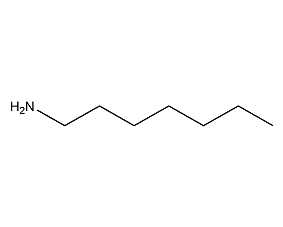
Structural formula
| Business number | 0342 |
|---|---|
| Molecular formula | C7H17N |
| Molecular weight | 115.22 |
| label |
1-Aminoheptane, aminoheptane, n-Heptylamine, 1-Amino-n-heptane, 1-Heptylamine, 1-Amino-n-heptane, 1-Aminoheptane, Heptylamine, 1-Heptylamine, Nitrogen-containing compound solvents, aliphatic compounds |
Numbering system
CAS number:111-68-2
MDL number:MFCD00008244
EINECS number:203-895-8
RTECS number:MK0600000
BRN number:1731688
PubChem number:24873918
Physical property data
1. Properties: colorless liquid[1]
2. Melting point (℃): -23[2]
3. Boiling point (℃): 155[3]
4. Relative density (water=1): 0.777[4]
5. Relative vapor density (air=1): 4.0[5]
6. Heat of combustion (kJ/mol): -4927.8 [6]
7. Critical pressure (MPa): 2.85[7]
8. Octanol/water partition coefficient: 2.57 [8]
9. Flash point (℃): 35[9]
10. Ignition temperature (℃) ): 267[10]
11. Solubility: Slightly soluble in water, soluble in ethanol and ether. [11]
12. Refractive index (20ºC): 1.4245
13. Dissociation constant (25ºC): 4.6×10-4
Toxicological data
1. Acute toxicity: mouse abdominal cavity LD50: 100 mg/kg;
2. It is moderately toxic and can irritate eyes, skin and mucous membranes. The LD50 of intraperitoneal injection of heptylamine sulfate in rats was 42 mg/kg. It has systemic effects on the human body. Oral administration of 2 mg may slightly increase blood pressure. Oral administration of 5 mg may cause palpitations, dry mouth, headache, and numbness of limbs.
3. Acute toxicity [12] LD50: 100mg/kg (mouse abdominal cavity)
Ecological data
1. Ecotoxicity No data available
2. Biodegradability No data available
3 .Non-biodegradability No information available
4. Other harmful effects[13] This substance is harmful to the environment and should be specially Pay attention to water pollution.
Molecular structure data
1. Molar refractive index: 38.01
2. Molar volume (cm3/mol): 147.7
3. Isotonic specific volume (90.2K ): 339.6
4. Surface tension (dyne/cm): 27.9
5. Polarizability (10-24cm3): 15.07
Compute chemical data
1. Reference value for hydrophobic parameter calculation (XlogP): None
2. Number of hydrogen bond donors: 1
3. Number of hydrogen bond acceptors: 1
4. Number of rotatable chemical bonds: 5
5. Number of tautomers: none
6. Topological molecule polar surface area 26
7. Number of heavy atoms: 8
8. Surface charge: 0
9. Complexity: 35.4
p>
10. Number of isotope atoms: 0
11. Number of determined atomic stereocenters: 0
12. Number of uncertain atomic stereocenters: 0
13. Determine the number of stereocenters of chemical bonds: 0
14. Uncertain number of stereocenters of chemical bonds: 0
15. Number of covalent bond units: 1
Properties and stability
1. Has the chemical properties of primary amines. When heptylamine nitrite obtained from hydrochloric acid and nitrite is pyrolyzed, a mixture of 48.3% heptanol, a small amount of 3-heptanol, 25.5% heptene and 5% diheptylnitrosamine is produced.
2. Stability[14] Stable
3. Incompatible substances[15] Strong oxidants, acids, acid anhydrides, acid chlorides, carbon dioxide
4. Polymerization hazards [16] No polymerization
5. Decomposition products[17] Ammonia
Storage method
Storage Precautions[18] Stored in a cool, ventilated warehouse. Keep away from fire and heat sources. The storage temperature should not exceed 30℃. Keep container tightly sealed. They should be stored separately from oxidants, acids, and food chemicals, and avoid mixed storage. Use explosion-proof lighting and ventilation facilities. It is prohibited to use mechanical equipment and tools that are prone to sparks. The storage area should be equipped with emergency release equipment and suitable containment materials.
Synthesis method
1. Dissolve n-heptaldehyde oxime (see 20965) in absolute ethanol, heat to boiling, add sodium strips, and maintain boiling to reflux. After the sodium is dissolved, cool the reactant, dilute it with water, distill the reaction material, and remove ethanol, water and unreacted oxime from the distillate. The n-heptylamine hydrochloride in the residue will crystallize out, and it can be treated with alkali to obtain heptylamine. Amine, yield 60-73%.
2. Refining method: Depending on the synthesis method, it often contains impurities such as diheptylamine, tripeptane and unreacted substances. It is generally refined by adding metallic sodium for dehydration and then distillation.
Purpose
Used as solvent and used in organic synthesis. [19]

 微信扫一扫打赏
微信扫一扫打赏

